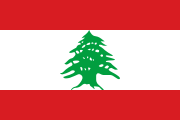The Lebanon PortalA view of Byblos, Lebanon
 Lebanon (/ˈlɛbənɒn, -nən/ LEB-ə-non, -nən; Arabic: لُبْنَان, romanized: Lubnān, local pronunciation: [lɪbˈneːn]), officially the Republic of Lebanon, is a country in the Levant region of West Asia, bordered by Syria to the north and east, Israel to the south, and the Mediterranean Sea to the west; Cyprus lies a short distance from the country's coastline. It is at the crossroads of the Mediterranean Basin and the Arabian Peninsula. Lebanon has a population of more than five million and an area of 10,452 square kilometres (4,036 sq mi). Beirut is the country's capital and largest city. Human habitation in Lebanon dates to 5000 BC. From 3200 to 539 BC, it was part of Phoenicia, a maritime empire that stretched the Mediterranean Basin. In 64 BC, the region became part of the Roman Empire, and later the Byzantine Empire. After the 7th century, it came under the rule of different caliphates, including the Rashidun, Umayyad and Abbasid Caliphate. The 11th century saw the establishment of Crusader states, which fell to the Ayyubids and the Mamluks, and eventually the Ottomans. Under Ottoman ruler Abdulmejid I, the first Lebanese proto-state, the Mount Lebanon Mutasarrifate, was established in the 19th century as a home for Maronite Christians, in the Tanzimat period. Lebanon is a developing country, ranked 112th on the Human Development Index. It has been classified as an upper-middle-income state. The Lebanese liquidity crisis, coupled with nationwide corruption and disasters such as the 2020 Beirut explosion, precipitated the collapse of Lebanon's currency and fomented political instability, widespread resource shortages, and high unemployment and poverty. The World Bank has defined Lebanon's economic crisis as one of the world's worst since the 19th century. Despite the country's small size, Lebanese culture is renowned both in the Arab world and globally, powered primarily by the Lebanese diaspora. Lebanon is a founding member of the United Nations and of the Arab League, and is a member of the Non-Aligned Movement, the Organization of Islamic Cooperation, the Organisation internationale de la Francophonie, and the Group of 77. (Full article...) This is a Featured article, one of the best articles Wikipedia has to offer.
The Roman temple of Bziza is a well-preserved first century AD building dedicated to Azizos, a personification of the morning star in ancient Arab polytheism. This Roman temple lends the modern Lebanese town of Bziza its current name, as Bziza is a corruption of Beth Azizo meaning the house or temple of Azizos. Azizos was identified as Ares by Emperor Julian. The tetrastyle prostyle building has two doors that connect the pronaos to a square cella. To the back of the temple lie the remains of the adyton where images of the deity once stood. The ancient temple functioned as an aedes, the dwelling place of the deity. The temple of Bziza was converted into a church and underwent architectural modification during two phases of Christianization; in the Early Byzantine period and later in the Middle Ages. The church, colloquially known until modern times as the Lady of the Pillars, fell into disrepair. Despite the church's condition, Christian devotion was still maintained in the nineteenth century in one of the temple's niches. The temple of Bziza is featured on multiple stamps issued by the Lebanese state. (Full article...) Did you know (auto-generated) -
TopicsRelated portalsReligions in Lebanon Arab states Other countries This is a Good article, an article that meets a core set of editorial standards.
The Democratic Left Movement (DLM, Arabic: حركة اليسار الديمقراطي Harakat Al-Yassar Al-Dimuqratiy, Arabic acronym HYD) is a nonsectarian and a democratic leftist political party. It was founded in September 2004 by left-wing and center-left intellectuals and activists some of whom had previously split from the Lebanese Communist Party (LCP) while some were student activists from the "Independent Leftist Groups". The DLM affirms a European-style social democracy—but is open to all forms of leftism and encourages the development of a true secular state. The party operates under a decentralized framework that emphasizes diversity of thought for a progressive society in a liberal democratic environment. It participated in the 2005 Cedar Revolution, a wave of demonstrations against the Syrian occupation of Lebanon, and calls for correcting imbalanced relations with Syria. The DLM won its first parliamentary seat in Lebanon's 2005 elections representing the Tripoli district. On 2 June 2005, amid election rounds, Samir Kassir, a founder of the movement, was assassinated in a car bombing. Less than one month later, George Hawi, a former secretary general of the Lebanese Communist Party and an ally of the DLM, was killed in a similar car bombing in Beirut. In the 2009 elections, the party again won a single seat, instead representing the West Bekaa district. It is a member of the March 14 Alliance parliamentary coalition. (Full article...) General imagesThe following are images from various Lebanon-related articles on Wikipedia.
CategoriesAssociated WikimediaThe following Wikimedia Foundation sister projects provide more on this subject:
SourcesDiscover Wikipedia using portals |























































